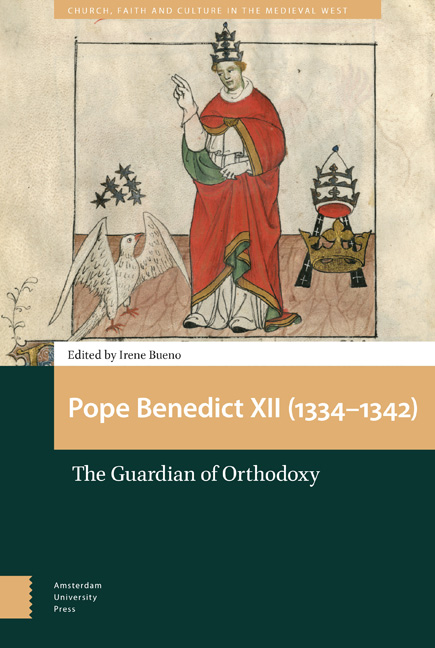Book contents
- Frontmatter
- Contents
- Abbreviations
- List of Illustrations
- Introduction: Benedict XII, the Guardian of Orthodoxy
- 1 Jacques Fournier and Thirteenth-Century Inquisitorial Methods
- 2 Recovering a Theological Advice by Jacques Fournier
- 3 Benedict XII and the Beatific Vision
- 4 A New Seat for the Papacy: Benedict XII, Avignon, and the Comtat Venaissin
- 5 In the Footsteps of St Peter: New Light on the Half-Length Images of Benedict XII by Paolo da Siena and Boniface VIII by Arnolfo di Cambio in Old St Peter’s
- 6 Benedict XII and Italy: Restoring Orthodoxy and Consolidating Papal Sovereignty after John XXII
- 7 Benedict XII and the Outbreak of the Hundred Years’ War
- 8 Benedict XII and the Crusades
- 9 Benedict XII and the Partes Orientis
- Index of Names
- Index of Subjects
Introduction: Benedict XII, the Guardian of Orthodoxy
Published online by Cambridge University Press: 11 December 2020
- Frontmatter
- Contents
- Abbreviations
- List of Illustrations
- Introduction: Benedict XII, the Guardian of Orthodoxy
- 1 Jacques Fournier and Thirteenth-Century Inquisitorial Methods
- 2 Recovering a Theological Advice by Jacques Fournier
- 3 Benedict XII and the Beatific Vision
- 4 A New Seat for the Papacy: Benedict XII, Avignon, and the Comtat Venaissin
- 5 In the Footsteps of St Peter: New Light on the Half-Length Images of Benedict XII by Paolo da Siena and Boniface VIII by Arnolfo di Cambio in Old St Peter’s
- 6 Benedict XII and Italy: Restoring Orthodoxy and Consolidating Papal Sovereignty after John XXII
- 7 Benedict XII and the Outbreak of the Hundred Years’ War
- 8 Benedict XII and the Crusades
- 9 Benedict XII and the Partes Orientis
- Index of Names
- Index of Subjects
Summary
Abstract
Benedict XII (c.1334-1342) was a key figure of the Avignon papal court. He was renowned for rooting out heretics, and distinguished himself as a refined theologian. During his reign, he faced the most significant religious and political challenges in the era of the Avignon papacy: theological quarrels, divisions, and schisms within the Church, conflicts between European sovereigns, and the growth of Turkish power in the East. This book offers a unique overview of his career and pontificate, bringing together nine chapters that discuss the existing literature and address original perspectives based on new research. In spite of its diminished political influence, the papacy, which had recently moved to France, emerged as an institution committed to the defence and expansion of the Catholic faith in Europe and the East. Benedict made significant contributions to the definition of doctrine, the assessment of pontifical power in Western Europe, and the expansion of Catholicism in the East: in all these different contexts he distinguished himself as a true guardian of orthodoxy.
Keywords: Benedict XII, Jacques Fournier, Avignon papacy, medieval Church history, orthodoxy and heterodoxy
On 13 December 1334, a few days after the death of John XXII (1316–1334), twenty-four cardinals gathered in conclave in Avignon. By the end of the week, the majority – according to some, all – of the assembly elected as John's successor the Cistercian cardinal Jacques Fournier (c.1285–1342). Born in Saverdun in the Ariège region, he ascended the papal throne on 8 January 1335 with the name of Benedict XII, and died in Avignon. According to the Florentine chronicler Giovanni Villani, the election was arduous and Fournier's name was proposed ‘almost as a dare, believing that it would not be done’ (quasi per gara, non credendo venisse fatto). The choice of one ‘regarded as the lowest of the Cardinals’ (il più minimo de’ cardinali) thus astonished many, probably on account of the new pontiff's political inexperience. Villani further remarks: ‘And once he was elected pope, everyone was surprised, and he himself, who was present, said: “You have elected an ignoramus” (Avete eletto uno asino)’.
Regardless of Villani's report, Jacques Fournier's pontifical election does not appear as something completely unexpected when considering his former career, as well as the influence of his maternal uncle Arnaud Novel – doctor of law, Cistercian abbot of Fontfroide, cardinal, and candidate to the papal throne after the death of Clement V.
- Type
- Chapter
- Information
- Pope Benedict XII (1334–1342)The Guardian of Orthodoxy, pp. 13 - 26Publisher: Amsterdam University PressPrint publication year: 2018



